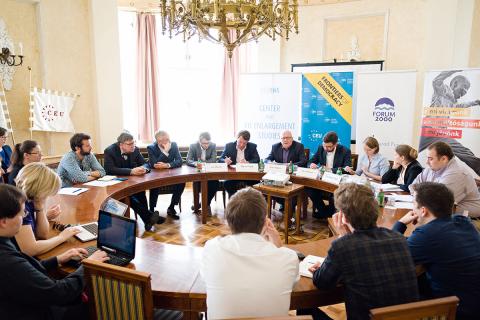Challenges of V4 Democracy Assistance - Event report

Visegrad countries should support Ukraine’s civil society financially and with their transition expertise, according to speakers at a roundtable discussion organized by CEU’s Center for EU Enlargement Studies (CENS) on May 14 as part of the Frontiers of Democracy series. The Visegrad countries, known as the V4, include the Czech Republic, Hungary, Slovakia and Poland, have not shown a united front toward the situation in Ukraine in recent months.
“V4 countries were very active in Ukraine in the first few months of the conflict,” said Jan Hornat, PhD candidate at the Faculty of Social Sciences at Charles University. “We have seen joint statements about a common approach. It was the individual countries’ considerations about their relations with Russia that caused the disarray soon afterwards, not a difference in their stand on Ukraine’s future.”
The roundtable, entitled “Challenges to Visegrad's Democracy Assistance: Ukraine and Beyond” was organized to discuss Hornat’s policy paper of the same title, which summarized the outcomes of a two-part workshop that took place during the annual Forum 2000 Conference in October 2014.
According to Hornat, out of the European Commission’s €365 million in financial aid to Ukraine in 2014, only €10 million were allocated to support civil society. Support from the EU to consolidate Ukraine’s society has mostly come in the form of “top-down democracy assistance”, says Hornat, who believes that strengthening civil society would be much more effective. He emphasized that the V4 countries should be more strategic in their foreign policy and realize that assisting democracy in Ukraine is a goal that benefits both parties.
“There is no Russian imperialism without Ukraine, and there is no successful Europe without Ukraine,” said Yevhen Hlibovitsky, of Ukrainian thinktank pro.mova, identifying the core of the conflict in Ukraine. He warned that even if Putin leaves at one point, “Putinism will stay.”
“Ukraine is a cat we expect to bark,” said Hlibovitsky urging Western analysts to reevaluate their preconceptions of Ukraine. In his views Ukraine works similarly to southern European countries in the sense that state agencies are very weak, and it is difficult to channel changes through them. Therefore making civil society stronger and more capable of influencing politics should be the priority for Western support, he said. Due to their historical and transition experience, V4 countries are best suited for this task, he added.
“Hungary supports Ukraine’s road to EU accession and is ready to help on the way,” said Timea Huber, head of the department of international development cooperation at Hungary’s Ministry of Foreign Affairs and Trade. She added that Ukraine is one of her office’s top priorities, and that it is involved in supporting education, healthcare, civil society, the media and local minorities in Ukraine. She said that a good, functioning system of public services is the key to building a successful society, and therefore, developing it is a priority of EU support. She agreed that the “bottom-up” approach is also essential.
Simon Panek, co-founder and director of the Prague-based NGO People in Need said that his work is split between the separatist territories and the areas controlled by the Ukrainian army, because “need is on both sides.”
“We can’t alter the battleground, or the politics between NATO, the EU and Russia, but we can help building a better functioning Ukraine,” said Panek. Regarding the support and education provided to civil society organizations in Ukraine, Panek thinks that local organizations are “busy enough themselves” and do not really have time to leave the country. Assistance and advisors from the West should therefore visit them “preferably for a long time, weeks, even months.”
“The democracy support narrative of V4 is undermined by the illiberal tendencies among the member countries,” said Zsuzsanna Vegh, research assistant at CENS. She emphasized that before exporting it, member states should embrace democratic values themselves and clearly formulate the motivations for supporting Ukraine.
She also said that the level of commitment to democratic values in V4 societies gives cause for concern. According to Eurobarometer’s findings, V4 citizens who had to identify the biggest challenges for developing countries, ranked “building a functioning democracy” below the EU average. In response to another question where V4 citizens had to choose the conditions that define a “decent life”, living in a democracy did not make it to the top five, and living in a country where human rights are respected, though in the top positions, was still below the EU average.
Peter Balazs, director of CENS and former Hungarian foreign minister, reminded the discussants how optimistic V4 members were after the fall of the Iron Curtain, believing that in three parliamentary cycles “we will have learned democracy.” According to Balazs, V4 countries have to face the fact that “the invisible hand of market economy” will not solve the economic challenges the region faces. He argued for maintaining the “four-wheel drive” of V4 and building parallel cooperations on a V4+ model. He also reminded that the Ukrainian conflict is “the greatest challenge to the post-Cold War security system so far.”
Following the panel Polish Ambassador to Hungary Roman Kowalski joined the discussion emphasizing that V4 countries are not in disagreement about the transition in Ukraine, but about their relations with Russia. He also reminded that “the level of help we give to other countries is a good indicator of our own values and commitment to democracy.”
“I believe that differences mostly manifest themselves on a rhetorical level, while V4 stands united on the sanctions against Russia,” commented Czech Ambassador to Hungary Juraj Chmiel. He added that the conflicting messages that imply discord among countries are aimed at a domestic audience, but are unfortunately exposed in the field of international relations.
The report originally appeared on CEU’s website.
For more pictures, visit our album on Facebook.
